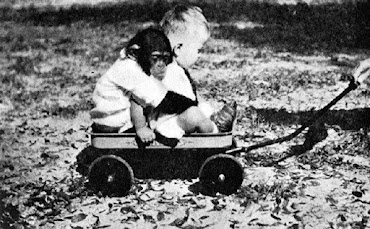Wild animals grow up living in the forest, due to which wild instincts appears in them. Lions, foxes, monkeys, bears, all these animals grew up living in the forest, due to which they acquire the qualities of wild animals. It is shown in some films that if humans grow up living in the forest, then wild nature also comes into them. Staying away from human society, that person living with animals adopted the wild nature of the animal. But can the reverse of this also be possible? If these wild animals are raised and fostered like humans, will they behave like humans and will be able to learn the living ways of humans?
To find out and find out, an experiment was conducted
many years ago, in which a chimpanzee baby was raised with a human child and the
results were very surprising.
In 1931, Winthrop and Luella Kellogg, a
psychologist husband and wife, adopted a chimpanzee baby and named it
Gua. Kellogg began raising the chimpanzee with a human child Donald and
began to compare the behaviour, mental and physical development of the two.
Donald was 10 months old while Gua was 7.5 months
old when the experiment was started. Both were raised like a brother and
sister. They were dressed in the same clothes, given the same kind of food
and taught the same activities. During this experiment, the developmental
traits of Gua and Donald such as their intelligence, reasoning power and their behaviours
were examined very closely.
The results that came out in the initial days were
very surprising, Gua turned out to be smarter and wiser than
Donald. Within 3 months, Gua was found to be very good in the results of
all the tests while Donald could not turn out to be that smart. Although
the scientists were not so surprised by these results because they knew that
chimpanzees are wild animals that develop their intelligence and reasoning
ability very quickly for their survival, naturally this quality is heredity
found in Gua. Whereas a person becomes intelligent by the time he reaches
his teens.
When both were over a year old, the results found
that Donald was better than Gua in language learning and mental development,
while Gua was far ahead of Donald in physical abilities such as walking,
running and climbing. But shortly after sometime, scientists realized that
the Gua, despite living among humans, was not able to talk and communicate at
all like humans. Scientists had already guessed this behaviour, but
scientists also thought that Gua would definitely use human voice to make its
grunt and noise. But they were wrong, there was absolutely no such thing
in Gua's antics.
Quite the contrary, a very interesting incident was
happening. Donald was learning how to growl and behave like a
chimpanzee. Scientists feared that if a human child was raised with a
chimpanzee, the child might become an orangutan. Due to this fear, Kellogg
stopped this experiment after 9 months. The chimpanzee and the human child
were returned from where they were brought. Unfortunately, Gua died of
pneumonia a year after separating from Donald.
This experiment was not very successful, but its contribution is still commendable in the field of psychology and its examples are still taken in human life.




Comments
Post a Comment